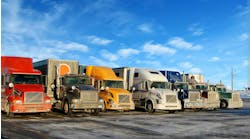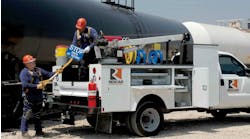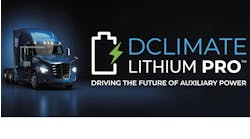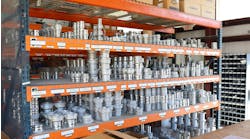Transtex introduces next-generation eAPU
Report: Parts, labor costs fall in Q4 2024
Ex-Guard intros exclusive Cascadia guard
Peterbilt adds LED headlights option
Kenan Advantage Group (KAG) is strengthening its presence within the bulk liquid food-grade transportation industry, and building a business capable of withstanding even the devastating impacts of a global pandemic.
Key ingredient No. 1 is the ability to pivot quickly, and meet ever-evolving needs of shippers.
“We’ve seen a lot of opportunity,” Tyler Coventry, executive vice president of KAG Food Products, said about dealing with the ongoing COVID-19 crisis. “We haven’t seen a significant downturn like other parts of the transportation network. Food Products has really been steady. We’ve actually seen quite a lot of growth throughout our network, in terms of being able to take more loads, through efficiencies and improving our network.
“The biggest thing we’ve seen is, whether you are working from home or in an office environment, you still need food.”
And, KAG Food Products aims to the be the carrier who makes sure those people receive it.
That’s key ingredient No. 2.
KAG previously transported food products under the names of the various trucking companies it acquired, including Transport Service, Landes Trucking and Charles G. Lawson Trucking. But late last year it went through a rebranding to unite all its food-grade bulk liquid fleets under the KAG Food Products name, helping grow awareness for the division’s capabilities, and reinforce the brand with longtime customers.
The third key to KAG Food Products’ current success—a new food-grade wash rack in Decatur, Alabama—is perhaps the most important ingredient, according to Grant Mitchell, KAG’s chief operating officer. He says company-owned wash facilities are a critical component of KAG’s transportation efficiency, and this one plays a particularly vital role in connecting its entire network.
“Wash racks are integral to our business, and not just our food division but across our different operating groups,” Mitchell said. “Wash racks and maintenance facilities give us the ability to control our own destiny. We’re really proud of our people, so we’re confident in the quality when we’re washing our own tanks, and in most cases where we have a wash rack, we also have a maintenance facility, so it really allows for good efficiency between washing and maintaining equipment.”
Growing operation
Food Products is one of six KAG divisions. Other divisions include Fuels Delivery, Specialty Products, Merchant Gas, Logistics and Canadian bulk operations. Together, they form North America’s largest bulk transportation and logistics provider to the fuels, specialty products, industrial gasses and food products industries, with 300-plus terminals and satellite locations, and more than 7,000 drivers, 6,500 trucks and 10,400 trailers.
KAG’s food division boasts more than 70 years of history in the food products industry, with its longevity due in large part to company leaders’ commitment to adhering to “best-in-class” trailer cleaning and product integrity processes. Food Products services include liquid and dry bulk transportation, temperature-controlled freight transport, tank washing, and dedicated contract carriage; and the division hauls every type of food product that’s out there, including liquid and dry sweeteners, edible oils, pet food ingredients, yeast, chocolate, enzymes, vinegar, fats and lards, frozen foods and beverage alcohol.
The food-grade operation includes 13 terminals, 400 drivers, 70 mechanics, 500 trucks and 800 trailers. The tractor fleet primarily consists of Class 8 Peterbilt trucks, but Coventry said they have a few Macks, Volvos and Freightliners picked up through acquisitions. Most trucks are long-haul sleeper cabs, with a few day cabs mixed in for shorter hauls. Trailers include liquid bulk tankers, dry bulk and pneumatic dry bulk trailers from Walker and Brenner—both Wabash National brands—and Polar Tank Trailer, and refrigerated trailers.
Most of the trailers are smooth-bore, liquid-tank trailers ranging in capacity from 5,000 to 7,000 gallons, and equipped with the necessary pumps and hoses for loading and offloading all types of food products. Oil trailers ranging from 6,000 to 7,000 gallons include in-transit heat, and many of the trailers can offload with air or hydraulics, with all accessories enclosed in boxes. Trailers carrying sweeteners typically run with 5,000-gallon tanks, pumps and two 20-foot hoses.
All tractor-trailers in the fleet are equipped with electronic logging devices and Bendix Wingman safety systems, Coventry said.
Equipment upkeep
Cleaning and maintaining all that equipment while keeping drivers on the road is a big job, and with food safety and product integrity so integral to its business, KAG primarily relies on its own nationwide network of wash racks and maintenance facilities, turning to third-party partners only when and where it makes sense.
The Food Products division has Kosher wash bays in Decatur and Jacksonville, Illinois; Lafayette, Indiana; Loudon and Memphis, Tennessee; Gainesville, Georgia; Port Barre, Louisiana; Neosho, Missouri; and—as of November 2019—Decatur, Alabama, which is centrally located between all of the food-grade wash bays in the network.
KAG Food Products’ newest wash facility was built from the ground up on a 10-acre lot. The project kicked off in February 2019 with the demolition of an old building on the property, and construction began in March of last year. Coventry said the entire project, from conception to realization, took approximately 18 months.
“Strategically the facility is perfectly located,” Coventry said. “We’re in a quiet industrial region right off the interstate, and with limited congestion in that area, it gives us easy access to move equipment in and out quickly.”
Coventry calls the new Decatur wash rack, which is located in the middle of KAG’s brick-and-mortar network, the Food Products division’s “pivot point,” helping connect northern and southern locations, with even spreads to Memphis, Gainesville and Loudon. It also helps KAG serve a major food ingredients shipper with a large oilseed processing operation in Decatur who played a pivotal role in the project’s inception.
“We’re strategic partners and, in terms of this specific tank wash in Decatur, Alabama, it adds flexibility to both our businesses,” Mitchell said. “We’re able to cover more regular business for them, as well as react to very short-notice requests, because trailers already are in position, they’re washed, and ready to go.”
Wash system
KAG’s newest wash system was ready to go when it arrived in Alabama. That’s why KAG returned to The Peacock Company to purchase two “plug-and-play” interior tank-cleaning machines, a Model 636 and a Model 660, which is the largest machine the company offers—boasting a powerful 4.2 million-BTU burner for heating.
“It’s a single-pass system, which eliminates the threat of cross-contamination, as opposed to a lot of the other systems out there that are recirculating, vat-type systems,” said Miranda McMas, special projects manager for Peacock. “The water is used once and then it goes in the drain and they treat it (with an ALAR Corp. water treatment system that extracts oils). And the system has such a big burner, it provides on-demand heating. There’s no boiler attached to it … so it’s more efficient than a lot of regular systems, simply because you’re only using gas when you’re running a wash cycle.”
Standard features with Peacock’s interior tank-cleaning machines include design in accordance with American Society of Mechanical Engineers (ASME) boiler and pressure vessel code standards; on-demand, high-pressure hot water and steam in one unit; capability for washing all tanker configurations; efficient usage of water/energy sources; interlocking electrical, gas and water control systems that promote personnel and equipment safety; automatic detergent and chemical blending; and remote-controlled stations that provide convenient and easy operation.
Users of Peacock’s food-grade tank wash systems can obtain multiple certifications, including Juice Products Association (JPA), Orthodox Union Kosher, Cargil Oil and Minnesota Corn Processors certifications.
“Our system is versatile,” McMas said. “Most of our customers are on the food-grade side, simply because of the single-pass feature, but we also have a lot of customers who wash out non-food grade, non-edible and chemical products. It’s good for the pneumatic trailers that have multiple ports, too. And something that makes our system stand out from others is we’re a high-pressure, low-volume system. We’re running at 600 psi, anywhere from 25 to 35 gallons a minute, where a lot of the other systems are running close to 100 gallons a minute at 150 psi. And with that high pressure, you get a lot better impingement on the surface of the tanker.”
The 636 machine features a 2.4 million-BTU burner. Each unit utilizes a coil over the burner to heat water, which runs over the hand-built burner stands through ASME-registered, Schedule 80 stainless steel piping. Both units have the capability for three chemical or detergent injections, so operators can introduce caustic, detergent or sanitizer solutions, depending on the product to wash out; and each unit is piped to both bays, so if one is down for maintenance, KAG still can wash in either bay with the other machine.
KAG’s Decatur setup uses one 30-horsepower blower capable of drying two trailers at one time. “Within 10 minutes, the tank’s dry because it was so hot (during the wash) the air just helps evaporate everything,” McMas said.
Peacock systems are programmable logic controller (PLC) driven and controlled with touchscreen displays. They come with pre-programmed wash recipes, including procedures for cleaning out most food-grade items available in the industry. Operators can use the system to generate wash tickets, Peacock offers remote monitoring, and all components are manufactured and assembled in Peacock’s Dallas Texas-area facility, where parts always are on hand.
“They’re turn-key systems,” McMas said. “So they come in skid-mounted, you put them in your equipment room and have someone bring gas, electric and water to it, you pipe the high-pressure line out to the point of application, and you’re ready to roll.”
Efficient, and safe
KAG Food Products wash bays clean oils and sweeteners, but typically don’t do both at the same location. The Decatur, Alabama location, which is certified by the Chicago Rabbinical Council, primarily cleans out Kosher food-grade and refined oils, along with yeasts and vinegars. The facility does not clean trailers or associated equipment, including pumps, fittings and hoses, that handle sweeteners or chocolates.
The four-bay facility, which has two wash bays and two service bays, primarily serves to complement KAG’s operations but also is open to third-party business, including trailer cleaning, and truck and trailer maintenance. “The wash bays are very complementary to our business,” Coventry said.
“For example, we have control over the wash bays, so we can wash when we need to, on demand, which helps us provide flexibility and quicker turns on our trailers. It’s a big benefit for us, to have everything on site, continue to wash trailers and be able to move them through our network.”
As with any wash facility, quality cleaning comes down to the right mix of time and temperature. Every piece of equipment is washed while observing stringent processes and procedures that exceed the Food and Drug Administration’s Food Safety Modernization Act standards for safety, and then inspected to ensure no residual product remains.
“Our new system allows us to wash two trailers at one time, which has been very beneficial,” Coventry said. “And we added in a high-volume air dryer, so we’re drying trailers at a much faster pace. With the technology and upgrades we’ve put in there, we’re really able to turn a wash quicker than we can at other locations.”
KAG Food Products does it safely by using SafeRack G4 Series gangways that provide operators with secure access to the top of the trailer, with everything they need to clean the tank’s interior within reach of a caged-in platform that rests on the trailer’s dome lid. Coventry said KAG also promotes safety at the wash rack by using it as a trailer-inspection bay. Technicians pay close attention to key maintenance items, like making sure tires are running at the correct psi, leading to fewer blowouts and longer tire life; and checking brake lights and braking systems.
“We keep the highest level of commitment to safety and compliance in mind across all our operating groups,” Mitchell said. “Safety always is a top priority for our people, our customers and the communities we operate in.”
Multiple benefits
The Decatur wash rack’s strategic location benefits the overall group, too. By providing a central terminal that better connects its surrounding lanes, KAG Food Products boosted its ability to handle add-on loads in the quick-ship, spot-freight market, which in turn delivers a more varied customer base to the company. “It helps us increase our footprint within the Food Products group, and allows us to be a solutions provider,” Coventry said.
That nimbleness also helped KAG increase its Decatur and overall business in recent months, compared to the slowdown many companies experienced during the virus’ summer resurgence.
By making it easier to run equipment through the Decatur facility, and better connecting its network of food-grade terminals, Coventry said KAG ensured it has the ability to continue growing its Food Products division, no matter what types of products it hauls in the future. “We’re going to continue to see growth in the Food Products side of things,” he maintained. “We’re seeing diets changing, with the way that people are considering food options today based more on sustainability, organics and specialized products, and that really opens us up for hauling more of those different types of products and increasing our footprint.”
And, in COVID times, KAG has the ability to limit driver and equipment exposure to the virus by using its own wash racks. “We have the added benefit of keeping drivers out of third-party wash bays, which limits their interactions with others,” Coventry said. “That’s another great thing about keeping it all internal.”
The Decatur location offers all the modern driver comforts, including full-service break facilities and plenty of parking with 24-7 access, but KAG currently is limiting the use of those conveniences to limit the potential for exposure to the virus. They’re also limiting driver interactions with customers, and providing drivers with hand sanitizer, disinfectants and face masks, while paying closer attention to truck cabs.
“We had a very rigorous program to begin with,” Mitchell said. “But no question we’ve made some improvements through COVID. Obviously we’re focusing on social distancing with our people at all locations. Entry to our facilities has been more restricted, people are wearing masks, additional sanitizers are available to our entire team, and we’re continuing to limit person-to-person exposure.”









